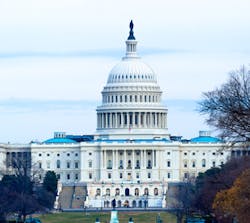Protection Legislation Proposed in Light of West Virginia Spill
By Patrick Crow, Washington Correspondent
On Thursday, Jan. 9, Freedom Industries leaked 7,500 gallons of 4-methylcyclohexanemethanol (MCHM) -- a compound used to clean coal -- into a Kanawha River tributary upstream from a water treatment plant serving the Charleston area.
Up to 300,000 people in nine counties were without tap water for up to a week. About 20 lawsuits were filed against Freedom, which sought bankruptcy protection eight days after the event.
Congressional committees had been working on legislation to reform the regulation of toxic chemicals before the spill occurred. A major point of contention had been whether states should be allowed to enact stricter chemical safety regulations than required by federal law. That could be a double-edged sword for the drinking water/wastewater industries: they might be better protected from chemical spills but might also fall under more stringent state environmental laws, such as "green chemistry" requirements.
At a West Virginia legislative hearing on the spill, Tom Curtis, deputy executive director for government affairs at the American Water Works Association (AWWA), suggested that all chemical storage tanks that might be a threat to drinking water supplies should be identified and subjected to appropriate and cost-effective regulation.
He said that nearby water utilities should be notified within an hour of a chemical spill but that they also need better federal guidance on how to handle contaminated water once an accident has occurred. Curtis explained that existing guidelines essentially say to store the water or obtain an NPDES permit to flush the system -- both of which were inadequate.
Curtis also said the federal government must find a way to improve the characterization of chemicals so that utilities can know more quickly how to respond to specific contamination events.
Eric Olsen, a Natural Resources Defense Council official, said the spill has underscored holes in the Safe Drinking Water Act, the Clean Water Act, and the Toxic Substances Control Act. "There are likely hundreds of other water companies, large and small, using surface water that simply cannot deal with a significant spill, release or other major pollution in their watershed," he said. "The vast majority of water systems do not use … modern technology, leaving them vulnerable to spills and other pollutants from upstream sources."
Heather White, executive director of the Environmental Working Group, commented on the lack of information on the health effects of MCHM. "The Elk River Spill highlights how this nation's entire chemical safety regime is broken from top to bottom, from the time chemicals come on the market with little to no testing, right through the entire lifecycle of the substance," White said. "Chemical safety laws intended to protect us are instead giving priority to the interests of chemical companies and manufacturers."
After the spill, hearings were held in both houses of Congress. West Virginia's two Democratic senators, Joe Manchin and Jay Rockefeller, introduced the "Chemical Safety and Drinking Water Protection Act" to strengthen states' ability to prevent chemical spills. The bill would ensure drinking water systems receive better instruction on how to respond to emergencies. State agencies would conduct regular inspections of aboveground chemical storage facilities. Operators would be required to develop state-approved emergency response plans that meet minimum guidelines.
The bill was referred to the Environment and Public Works Committee. Chairman and bill sponsor Sen. Barbara Boxer (D-Calif.) pointed out that the Clean Water Act already contains broad legal authority to address spill prevention and control, but that it has primarily been used to address oil-related hazards. "The spill prevention provisions for hazardous chemicals under the Clean Water Act have not been implemented, despite the fact that they were enacted decades ago," she said. "It is clear that we cannot afford to leave important opportunities to prevent chemical disasters on the shelf."
AWWA and the Association of Metropolitan Water Agencies said one deficiency of the Senate bill was that it does not mandate water utilities be given speedy notification of incidents or guidance on what to do with contaminated water.
"We think a gap in the current system is notification of the water system operators downstream," said Tommy Holmes, AWWA legislative director. "That notification got muddled in the West Virginia spill."
Although the legislation would not impose any new requirements on community water systems, it also does not mandate that they, like state agencies, be allowed to recover costs incurred from chemical-release emergencies.
The two water groups said that although the bill would require operators to provide nearby water utilities data on the "potential toxicity" of stored chemicals and response options, it did not address potential liability issues for community water systems that are given the information. The legislation does not require chemical facilities to notify downstream utilities when a spill occurs.
About the Author: Patrick Crow covered the U.S. Congress and federal agencies for 21 years as a reporter for industry magazines. He has reported on water issues for the past 15 years. Crow is now a Houston, Texas-based freelance writer.

